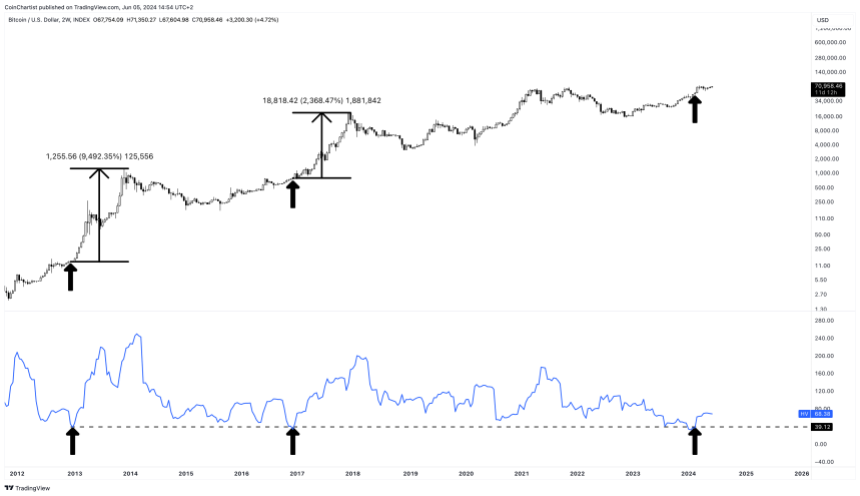Bitcoin Volatility Reaches Historic Low: Calm Before A 500% Bullish Storm?
Bitcoin price is back trading above $70,000 after weeks of sideways price action. The recent boredom and sideways grind, however, isn’t necessarily a bad thing. In the past, such lulls in volatility have preceded the top cryptocurrency’s greatest rallies on record. Let’s take a look.
Bitcoin Historical Volatility Reaches Record Low
The term volatility often has a negative connotation surrounding it. For example, Oxford Languages defines volatility as the “liability to change rapidly and unpredictably, especially for the worse.” In financial markets, the term refers to how much and how fast price moves within a specific timeframe.
To measure volatility, technical analysts use the historical volatility metric, which compares volatility across the entire existence of an asset’s price timeline. Using such a tool, analysts can compare and contrast past bouts of high or low volatility in an asset like Bitcoin.
Turning this tool on in BTCUSD reveals that on the 2-week timeframe, the top cryptocurrency by market cap is coming off the lowest volatility phase in its entire existence. More importantly, however, is the fact that the last two times that BTCUSD was this boring, it led to an over 9,000% and over 2,000% rally. The most recent made Bitcoin a household name, rising from around $1,000 to nearly $20,000 at its peak in 2017.
Now the signal is back, but what might this mean for the cryptocurrency market and holders who have waited through the recent sideways price action.

Third Time Is A Charm: Can BTC Climb 200-500%?
Volatility is cyclical in nature. After periods of high volatility and explosive price action, the market moves into a lull where prices move painfully sideways. When the sideways boredom ends, it usually ends with a bang and a return to the explosive price action that was evident before the lull.
Volatility can also be measured and even predicted using “implied volatility.” But the direction in which the volatility releases cannot be predicted with accuracy. Considering volatility is most often associated with negativity, there’s at least some probability that the low in volatility could be broken by an extreme dump in Bitcoin.
But the last two instances suggest otherwise, and the recent trend has been up. While BTCUSD likely won’t see another 9,000% rally nor a 2,000% rally like it did in 2013 and 2017, the first-ever cryptocurrency could do anywhere from a 200% to 500% surge.
At 200% and a price of $70,000 per coin, Bitcoin could end up peaking this cycle at around $140,000. At a 500% move from current levels, Bitcoin could reach $350,000 per coin. Higher multiples are indeed possible, but not probable considering the law of diminishing returns.
Tony Severino, CMT is the author of the CoinChartist (VIP) newsletter. Sign up for free. Follow @TonyTheBullBTC & @coinchartist_io on Twitter. Or join the TonyTradesBTC Telegram for daily market insights and technical analysis education. Please note: Content is educational and should not be considered investment advice.


